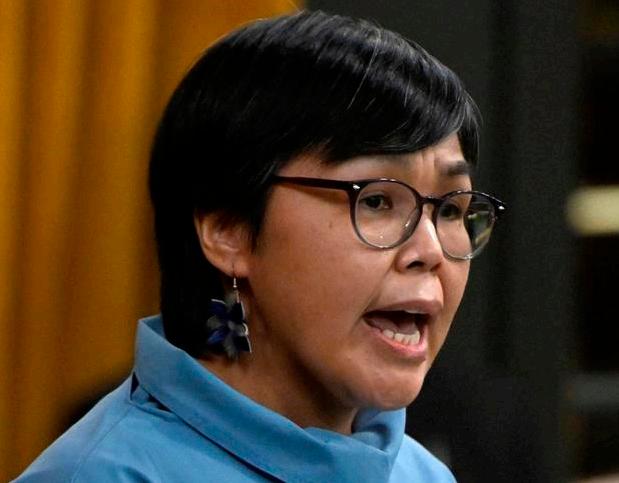






















When Dylan Guenther scored his second goal of the game at 6:22 of overtime to give Canada a 3-2 victory over Czechia to claim the International Ice Hockey Federation’s (IIHF) World Junior Championship, the roof nearly blew off the Scotiabank Centre in Halifax, N.S., on the evening of Jan. 5 — and Joseph Jr. Kaludjak and his family from Rankin Inlet were right in the middle of it.
Kaludjak, 47, said he’s been a big fan of junior hockey since he was just 10 years old and he’d always dreamed of one day attending the world juniors in person.
He said when he, his wife, Rachel, and their two children, Loli and Leo, entered their names in the IIHF’s priority draw — a lottery — for the chance to buy tournament tickets months before the event began — and Loli’s name was drawn — they just knew they had to go.
“We had been trying for awhile now and we finally got lucky with those lottery tickets,” said Kaludjak.
“This was a once-in-a-lifetime opportunity for us. We went to most of the games and had a total blast.
“We got four gold medal tickets and all got to go to the big game.”
Kaludjak said he found Halifax to be a
nice city with friendly people.
He said inside the Scotiabank Centre was “crazy loud” during games Team Canada played.

“I got caught up in all the excitement, cheering all out.
“It’s way better to see the games in-person than on TV. You can feel the whole crowd when everyone’s cheering.”
Kaludjak is a Toronto Maple Leafs fan when it comes to NHL hockey, and was maybe a bit disappointed that the Leafs didn’t have a single prospect in this year’s championship.
But, his whole family was cheering on Canada’s Connor Bedard and Kaludjak said he was just incredible to watch during the tourney.
“He’s something else, man.
“This was an experience I’ll never forget. I watched him (Bedard) score that overtime goal live (against Slovakia in the quarterfinals).
“I don’t even remember when I got to the glass when Canada scored (the overtime winner in the championship game), but I know I was the first to get there when Canada scored. And I was wearing a goalie mask too.
“It was unreal and so much fun. This has been our dream our whole lives as big hockey fans. If I ever have another chance to go, I will for sure.”
Haters gonna hate.
And those who don’t like sports just cannot relate to the sense of patriotic pride that rises up with the euphoria when a group of young hockey players capture the International Ice Hockey Federation’s (IIHF) World Junior Championship for Canada.
The nation literally shuddered with joy in living rooms and dens from Whitehorse to Gander, Nfld., and all points in between, when Dylan Guenther notched the twine in overtime to give Canada a 3-2 win over Czechia to become just the fifth team in the event’s history to win gold after losing its first game.
And, nothing could have been more perfect this past Thursday, Jan. 5, when, following the game, young rising superstar Connor Bedard ended his interview with “I love this country. This city right here (Halifax) has been unbelievable.”
More than 14 million Canadians watched the final game and that was just the tip of the iceberg as to the amount of love showed
to the IIHF’s premiere tournament during the 11 days in Atlantic Canada at Moncton, N.B., and Halifax, N.S.
The average number of television viewers for Team Canada games during the preliminary round was 1,501,900, with the Canada vs. Sweden game being the number one English sports broadcast in Canada on New Year’s Eve.
A total of 254 volunteers gave of their time to staff seven different committees in Halifax and Moncton. The volunteers worked 1,785 shifts, totaling more than 10,000 hours, during pre-tournament and the world juniors itself.
Social media posts sent across all Hockey Canada platforms (Twitter, Facebook, Instagram) from Dec. 19, when pre-tournament play began, through Jan. 4 earned 48,871,480 impressions and 2,560,649 engagements.
Attendance
There were more than 5,000 hotel nights booked in Halifax and Moncton by teams, Hockey Canada staff, IIHF staff and media and other groups.
There were more than 11,000 in-venue transactions in Halifax and Moncton, with an average transaction value of $91.87.
The amount of money generated from world juniors 50/50 ticket sales across all six participating provinces (British Columbia, Alberta, Saskatchewan, Ontario, New Brunswick and Nova Scotia) through Jan. 4 was a staggering $2.1 million.
All more than impressive numbers, no doubt, but the most important numbers to
the millions of Canadians waving flags and draped from head to toe in Team Canada paraphernalia were the 3-2 final score for the home nation and Canada claiming its 20th gold medal in the 46 world juniors that have been played.


The IIHF’s world juniors has become one of the most significant events on the hockey schedule for tens of millions of Canadians every year, with, arguably, fans in many smaller cities that are home to junior teams looking at the tourney as the premier event of the year.
One thing, in this hockey fan’s opinion, is that Halifax and Moncton proved this year beyond much doubt that those same smaller cities that are home to junior clubs, without the presence of an NHL team, are the perfect locales for when Canada hosts future world juniors.
Until then, we get to revel in our country’s 20th championship and exercise our bragging rights until the world gathers in Sweden for the 2024 event.
I love this country!

Nunavut Member of Parliament Lori Idlout is expressing concerns about Northerners not receiving the full benefits of the Nutrition North Canada (NNC) program.
The program, which is meant to help make nutritious food and essential items more affordable and more accessible for remote communities across Canada, still isn’t effective enough, according to the MP.
“For me it’s just the fact that while consumers, most who are Indigenous, are experiencing higher than normal levels of poverty, CEO
and shareholders are still getting profits. What my huge concern is about: why is the federal government subsidizing these for-profit corporations serving the NNC program when the program is supposed to be about alleviating poverty,” Idlout said.
The problem, explains the MP, is that private grocery providers monitor their own use of the subsidies provided by the Nutrition North program.
“There needs to be a better system to monitor funds used by Nutrition North because right now Northmart is allowed to monitor their own use of the subsidy. The federal government does not audit the program,” she contended. “The
last audit was back in 2019 and this audit was for the years 2014-2017, so the audits need to be more regular, and when they are happening, they need to make sure they are implementing the recommendations that have been made to make sure that it’s actually reaching its objectives.”
Idlout added that more money should be invested in local harvesting programs.
“The Nutrition North program does have a harvester support community program. I think that needs to be increased rather than having a bigger budget for profit corporations. Hunters that provide food for their families and feed whole communities should be compensated better for how expensive it is to go hunting.
There should be better support for individuals that are providing healthy nutritious food as opposed to a program that doesn’t necessarily work all that well,” said Idlout.
The federal politician representing Nunavut concluded with another concern brought to her attention when it comes to feeding the North: “Some people were telling me that sometimes when the fresh produce arrives from the plane it’s already expired. That too is a problem we need to talk about.”
The Government of Canada and the North West Company, owner of Northmart, did not respond to questions from Nunavut News prior to publication deadline.
Too much money going to corporations; more funds should go to harvesters, says Lori IdloutWhile corporate CEOs and shareholders are still turning profits, the Nutrition North Canada program should be “alleviating poverty,” says NDP MP Lori Idlout. Photo courtesy of the Canadian Press/Justin Tang







